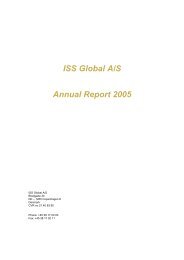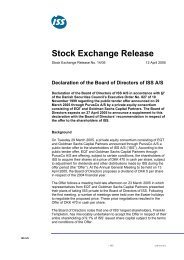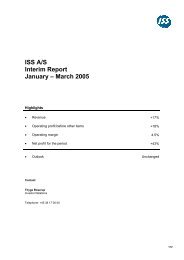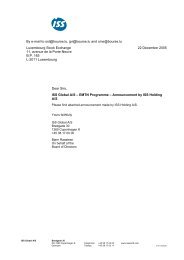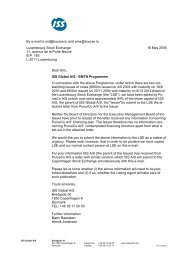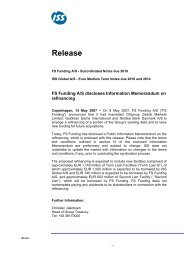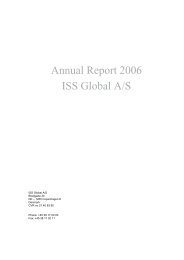I. Table of Contents - ISS
I. Table of Contents - ISS
I. Table of Contents - ISS
Create successful ePaper yourself
Turn your PDF publications into a flip-book with our unique Google optimized e-Paper software.
tatiana\Bank Book\Public Bank Book\FINAL <strong>ISS</strong> PUBLIC Bank IM - Press Release to EMTN_1.doc 9 Nov 2005 10:32 55/91<br />
55<br />
Company Overview<br />
For larger contracts, the quality <strong>of</strong> the service delivery is <strong>of</strong>ten measured against defined quality<br />
benchmarks stipulated in Service Level Agreements (SLA). More than 90% <strong>of</strong> <strong>ISS</strong>’s operations have<br />
adopted a formalised quality approach. Generally, <strong>ISS</strong> uses ISO certified quality management<br />
systems, and a number <strong>of</strong> countries have implemented Total Quality and Business Excellence models.<br />
The terms <strong>of</strong> <strong>ISS</strong>’s customer contracts vary widely by country and customer segment due to differing<br />
customer requirements and applicable legislation. However, <strong>ISS</strong> typically provides services under<br />
multi-year contracts with a stated term <strong>of</strong> between two and five years and reciprocal termination rights<br />
upon three to 12 months prior written notice. <strong>ISS</strong>’s commercial customer contracts typically provide<br />
for automatic renewal in the absence <strong>of</strong> a party’s notice to terminate the contract.<br />
<strong>ISS</strong> is highly focused on customer retention and, as a result, recently introduced Customer Retention<br />
Managers in a number <strong>of</strong> countries with the aim <strong>of</strong> improving customer churn rates even further.<br />
<strong>ISS</strong> also provides its services to governmental entities, primarily in Europe. The contractual<br />
arrangements with these entities differ from <strong>ISS</strong>’s commercial contracts in that they are generally<br />
subject to public procurement rules. Under these rules, facility services contracts are generally<br />
retendered on a regular basis. As a result, <strong>ISS</strong> must tender to maintain existing governmental<br />
contracts. <strong>ISS</strong> will seek to continue to provide facility services to public sector customers in the future.<br />
In the United Kingdom, <strong>ISS</strong> has entered into a number <strong>of</strong> arrangements with government-owned<br />
hospitals under Private Finance Initiative (PFI) contracts. The PFI contracts generally have a contract<br />
length <strong>of</strong> between five and 30 years. With respect to three projects, <strong>ISS</strong> has a joint equity investment<br />
in the entity providing services under the contract along with third party equity sponsors <strong>of</strong> the project.<br />
<strong>ISS</strong> is providing some form <strong>of</strong> facility services in each <strong>of</strong> the PFI projects, ranging from new hospital<br />
builds with integrated facility services to single services contracts. Under some <strong>of</strong> the PFI contracts,<br />
<strong>ISS</strong> has agreed that, in the event that the entity is unable to pay for <strong>ISS</strong>’s services, then <strong>ISS</strong> will<br />
convert its receivables from the entity into a loan.<br />
G. Human Resources<br />
The facility services industry is characterised by relatively high levels <strong>of</strong> employee turnover, as the<br />
industry is <strong>of</strong>ten considered a short-term or secondary source <strong>of</strong> employment. As a result, <strong>ISS</strong> pursues<br />
a number <strong>of</strong> strategies to reduce the turnover among blue collar employees, including arranging for<br />
more full-time and daytime work. <strong>ISS</strong> also seeks to enhance employee satisfaction and reduce<br />
turnover by providing multitasking jobs, encouraging career development opportunities and providing<br />
programs designed to promote teamwork and skills development. In 2004, the share <strong>of</strong> full-time<br />
employees (working 25 hours or more per week) rose to 57% from 55% in 2003. The distribution <strong>of</strong><br />
employee tenure (in years) provides another perspective on employee loyalty at <strong>ISS</strong>. In 2004, 69% <strong>of</strong><br />
the Group’s employees had been with <strong>ISS</strong> for more than one year.<br />
Figure 15: Total Number <strong>of</strong> Employees and Percentage <strong>of</strong> Full Time Employees<br />
# <strong>of</strong> Employees<br />
Source: <strong>ISS</strong><br />
400,000<br />
300,000<br />
200,000<br />
100,000<br />
0<br />
53%<br />
55%<br />
248,500 245,000<br />
57%<br />
273,500<br />
2002 2003 2004<br />
Number <strong>of</strong> Employees Share <strong>of</strong> employees full time<br />
60%<br />
50%<br />
40%<br />
30%<br />
20%<br />
Share <strong>of</strong> Full-time<br />
Employees<br />
Reduction <strong>of</strong> employee turnover is one <strong>of</strong> the principal challenges <strong>ISS</strong> faces. <strong>ISS</strong>’s employees are<br />
generally members <strong>of</strong> trade unions, and employee and trade union relations have a high priority to <strong>ISS</strong>.



